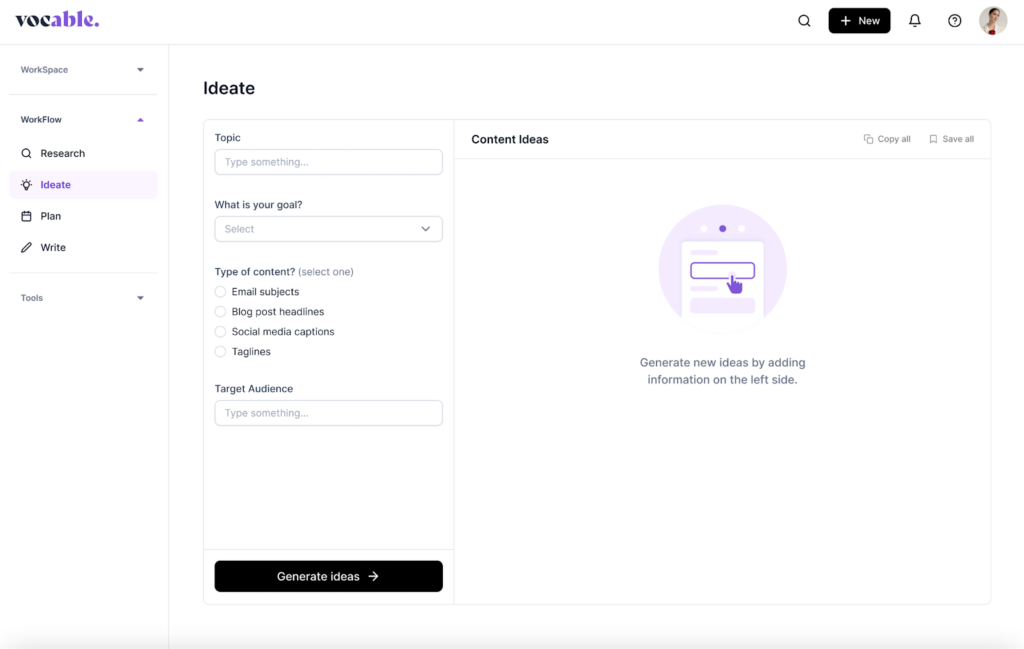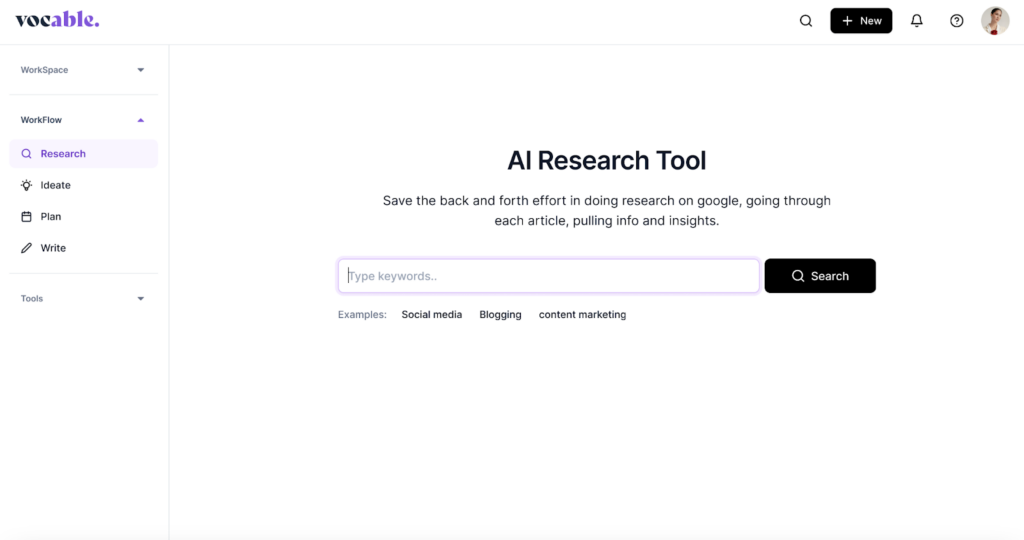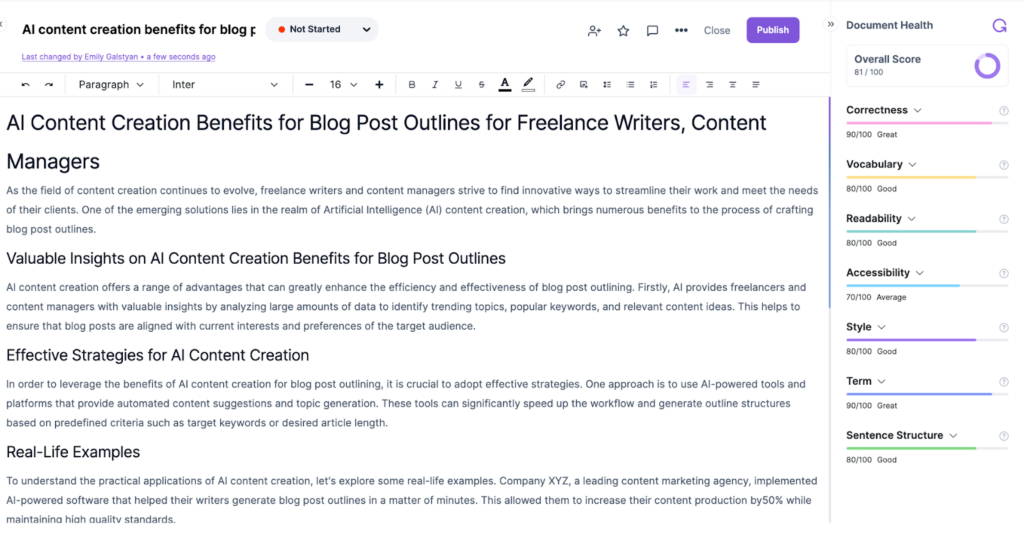That’s why every time a disruptive innovation like AI strikes, a huge wave of skepticism and panic takes over the market.
And while the global population is divided into those who welcome AI with apprehension and those who are excitedly in awe of its potential, the business world largely appreciates this technology.
Recent stats show 35% of businesses already use AI, with another 42% exploring it to understand its full potential before implementing it. Overall, the expectations are positive, with 64% of businesses anticipating AI to increase company productivity.
If you’re related to the business sector (especially content creation) in any way, struggling to understand if AI is an innovation for the greater good you shouldn’t miss, or if it’s just a passing trend, this blog may help you.
We are not Vangas to give you the exact picture of the future business world with AI inculcated. But we’re here to share where AI has already proven its effectiveness in content generation to inspire you.
Introduction to AI-Generated Content
AI-generated content marketing is growing with impressive volumes. Since February 2022, web searches have related to a 900% increase in AI content. So what is AI-generated content, and how much usage of AI turns content into artificially generated one?
Well, AI-based content generation refers to any content – written, visual, audio, or else generated by artificial intelligence tools instead of conventional manual techniques. AI-generated content examples include those that were developed by machines from scratch or those created with human involvement along with AI platforms.
If we talk about AI-generated blog content – one of the most popular trends in the domain- AI drafts it in minutes thanks to its ability to pull existing information from the web and arrange it according to human request.
Going one step further, AI-generated content for SEO also automatically incorporates keywords, matches search intent (to the extent of each tool’s capacity), and optimizes the content for SEO.
While many think ChatGPT is the one that set the era of generative AI content, that’s not the whole truth. Most of those involved in content creation have previously used AI-based grammar checker Grammarly, an automated text paraphraser like QuillBot, etc.
All those tools are part of the same family, moving the world toward AI-generated content in their way. However, as ChatGPT came with loud noise and developers’ promises of revolutionizing content and overall information delivery, it grabbed the attention of a much wider public.

What’s the Buzz about AI Content Creation?
Most content creators, previously bearing all the hard jobs of creativity and research on their shoulders with solely manual techniques, know what a big burden AI has relieved them from. So far, it has kept all the main promises made at the beginning of its emergence.
- Research is faster, though fact-checking remains something AI still struggles with.
- Most creativity blocks are a thing of the past, as AI creativity tools provide inspiration and guidance whenever creators get stuck.
- Content production is way faster with AI, as it can generate big fractions of well-organized content in minutes, while humans might take hours for the same job.
OK, this perfectly justifies the buzz about AI-generated content in professional communities. But the hype of using AI to create content went far beyond the world of content creators, and here are two reasons we think stand behind such popularity.
AI simplified and still has a space to streamline the fierce pressure of continuously creating competitive content for search engines.
Before, it was mostly a human-with-technology battle, where SEOs, content marketers, business owners and individuals were under constant pressure to figure out how algorithms work to outrun competitors. Using AI for content, many non-professionals can now create high-ranking content faster and more efficiently, better navigating the complicated world of content. The AI-based research tools give a whole bunch of SEO insights to those who can’t afford expensive SEO tools or huge analytical teams.
AI aligns the human speed of content production with the unbelievably fast pace of online search, competition, and evolving search engine algorithms.
At some point, moving from manual to automated content generation was necessary for those who wanted to stay competitive and needed more time and resources to produce enough content. There are too many newly-launched online channels where businesses must keep a quality presence to grow online. Besides, the global informational pressure is only increasing, not forgiving those who move slowly in the race to deliver fresh content.
Applications of AI-Generated Content in Business
Where should businesses use AI-based content generation to extract the most benefit? Here are some ideas.
AI-Generated Blog Posts and Articles
Bloggers spend 30% less time with AI-generated content for SEO, automating all the parts of the process, from keyword research and ideation to the actual content generation. With blog articles still being one of the key drivers of organic traffic, leveraging the power of AI-generated content for blogs is essential for most businesses.
AI-Generated Social Media Posts
There are almost no disadvantages of AI in social media if you carefully oversee the generated content and check its accuracy. Businesses heavily rely on AI for their social media tasks, such as visual and textual content creation, automated video editing, chatbot content creation, and more!
AI-Generated Email Campaigns
AI-generated content is used by 63% of marketers for email marketing. Artificial intelligence successfully personalizes email texts relying on customer data, helps with more precise targeting and customer segmentation, and makes the process faster and more efficient overall. You get catchy subject lines and email copies faster without worrying about typos, grammar errors, and other manual mistakes.
AI-Generated Chatbots for Customer Support
Lastly, AI can interact with your community on your behalf based on your training in how and when to respond to customer inquiries. It can personalize greetings, continue the chat in a conversational tone, engage customers by navigating them through the buying process, and much more. Here are ten ways chatbots can simplify quality customer service for you.
4 Tips to Survive the Game of AI-Generated Content Marketing
Hello from Vocable – an advanced content automation and maturity platform that works to bring AI-generated content closer than ever to every business.
- You can use Vocable to research keywords and customer-specific queries for a competitive content strategy.
- Further, you can ideate and expand your content strategy by creating and assigning briefs to your team.
- There are ready-to-use content templates for everything from short emails to long-form blog articles that help you create better content faster.
- And when your drafts are polished and ready to go live, you can schedule and publish them directly from Vocable to any of your preferred channels.

Below you can find the easiest formula to use AI for content with no complicated technical steps.
AI for Content Ideation
Though we don’t have exact statistics to prove this claim, “what to write about” is most probably pronounced or thought billion times daily worldwide. Content ideation, or identifying the topics to be used in marketing content, is the hardest part, squizzing the brain out of ideas.
The right approach to content ideation should rely on all or most of the below analysis.
- Data-driven trend analysis, identifying the hottest topics within your niche at the moment, so you know which posts will instantly sparkle the interest of your audience.
- Customer sentiment analysis or a tactic aiming to understand your target’s attitude and opinion toward certain topics or events. This information can be extracted by social listening or surveys, revealing what is being said about your brand.
- Of course, competitor analysis is to see where your rivals in content perform the best and which topics, formats, or keywords they’re exploiting for success. The same works in the opposite direction – you should see their content gaps so that you can take advantage of them.
- Keyword research, a more professional way of content ideation, is performed by specialized SEO tools like Ahrefs, SEMrush, Ubbersuggest, and other giants. These tools extract search engine query frequency data, hinting at the most popular content topics among your target audience to write about.
How to Ideate with Vocable?
The complex process described above is extremely simplified in Vocable to a friendly survey window asking you which type of content you want to create, your goal, audience, preferred style, etc.
You fill in the blanks and get a generated list of fresh ideas backed by reliable data analysis.

AI Generated Content for SEO
While many try to figure out the answer to the question “Does Google penalize AI-generated content?” let’s tell you one thing Google surely penalizes. It’s bad content – irrelevant to search queries, lacking depth, details, and accuracy, or simply just low-quality. And it doesn’t matter whether it was AI-generated content or crafted by a human – if it fails to meet Google ranking factors, it won’t appear on the first page.
How can AI help you here? For example, you can get AI-generated website content in minutes by clearly explaining what you need to your preferred AI tool.
Before that, you can boost your keyword research by asking AI tools to provide the key terms and expressions you should target with your content. And if you aren’t familiar with any of the keyword research tools above, no worries, Vocable’s here to help.
SEO Keyword Research with Vocable
Here’s a friendly, minimalistic search bar ready to provide you with tons of SEO data once you insert a specific topic. See the magic yourself.

Voi-la! Here you have the list of suggested key phrases, the exact volume of search queries each term received in a month, its difficulty to rank on Google, and other essential metrics. Based on this data, you can wisely choose keywords you should target in your content.

AI Content Development
Ideas, keywords – all these initial steps are great, but you still have to write the content once you’re through them. And the generation of the actual content is what usually takes a huge chunk of time, and it’s also what modern AI is trained to do at its best.
When you provide a topic to AI to write about, it uses its NLG algorithms at full power to create a relevant content piece for you in seconds, which aligns with what’s available on the web according to your requested topic.
For your peace of mind and because AI is still learning, you should scan the generated content for errors and adjust it according to your taste. You should also be extremely careful with all the facts, numbers, data, and other mentions that can be misinterpreted by the AI tool.
But overall, the significant portion of labor-intensive content generation is removed from the process, making you a content editor instead of the content researcher + writer + editor you used to be.
AI Generated Content for SEO with Vocable
When you need to write, choose the “Write” tool of Vocable from your account’s left-side panel. Here, you can use AI to generate prompts to quickly incorporate them into your content and see your draft’s health in terms of correctness, vocabulary, accessibility, style, and other critical factors.

The left side is for AI prompts. Type anything you want Vocable to help you with, such as topic introduction, headings, summaries, supporting facts, and more. Further, copy this AI-generated content into the editor, refresh the document health score on the right side of the doc, and see where you need to adjust or change the content.

Planning and Collaboration
Lastly, no AI-generated content can be so perfect that none of your colleagues has improvement comments. And if you’re serious about publishing regular content, ensure you develop a smooth team collaboration and review process that helps your content gets the best feedback and goes out in time.
Team Collaboration and Content Management with Vocable
Things are pretty simple in Vocable. You can create teams, add members, control their access levels to content, and assign tasks to team members for better performance.
Let’s see how it works.

Adding Teams in Vocble is a matter of a click. Just note a team name and description, especially if you’re going to have a few of them so that you can manage different content crews with no chaotic mess.
When your team is created, add members by sending direct invites to their emails. You can manage their access levels to content, assign tasks and get easy-to-follow reports on the team’s performance.
Is It Really Worth It?
Now, putting the concept of using AI to create content on a fair scale – does it come with pure benefits and no drawbacks?
Let’s see…
Benefits of AI-Generated Content
Saves Time and Money on content creation
AI-based content generation frees you from needing a large content team. Yes, professionals worldwide claim AI can’t replace humans; it can just become a helping hand to content creators. But this helping hand significantly accelerates human work and multiplies the volume of deliverables your single team member can provide to you.
So, though you can’t move on with no content writers’ team, you can have more content with fewer people than before, which is a great cost-saver.
Besides, AI-generated content saves many time-consuming tasks that writers tend to struggle with, such as researching the topic, developing the agenda, and generating the actual text. Humans now oversee what the machine has done and just have to adjust it to the desired direction. This takes far less time than doing all the steps manually.
Solves the Issue of Writer’s Block
Every writer has days when stories come out with a great flow and days when the blank page refuses to work with them. And when deadlines are pressing, this is a real problem.
Writer’s block is a common issue, slowing writers down and making them lose precious time. Usually, this stop in the writer’s creative engine happens because of the need for more ideas or research material, running out of steam, being stuck with the same article for too long, or simply due to procrastination.
With AI, such blocks never happen (forget ChatGPT crushes from time to time). AI has an endless pool of ideas and research material to feed the writer’s mind, and the machine is never tired, so it continues to provide data as long as you need it.
Accelerates Content Production
Because of all the benefits mentioned above, using AI for content creation accelerates content production and makes it available on a much bigger scale than before. Most companies report a higher volume of content deliverables with AI-driven tools and even much better quality than they used to see before.
One AI tool can produce the same amount of content as a few writers working together on it. And with increased productivity, companies can achieve better visibility, higher website traffic, and more sales in the end.
With AI-generated content, companies can have a higher frequency of news releases, better coverage across different industries, and better shift their content strategy according to the latest trends.
Inspires Creators with Fresh Ideas
The same person thinking on the same topic always gets stuck with ideas sooner or later. Thinking outside the box is easier said than done, and often even the most talented writers need a helping hand to break the creative boundaries.
AI generates many topic ideas, from long-tail keywords and search phrases to questions and conversation starters. This can give the writer a new perspective on an old topic or even open up some unexplored directions in the field.
Partially Eliminates the Need for Professional SEO Skills
In the example of Vocable’s keyword research, you can craft your content with the best keywords without any professional SEO skills with AI tools. If before you needed to master the whole range of SEO trends and tricks to generate content with targeting keywords – now, it’s enough to type in a few basic words in AI, and it will do the work for you.
There is also less need to figure out how professional SEO software work. AI tools mimic best practices in content optimization and give you an easy-to-follow wizard to craft SEO-friendly articles without any professional SEO knowledge.
Of course, if you need thorough SEO optimization, you still need a professional SEO specialist. But for some basic content optimization, AI can do a great job.
Limitations of AI-Generated Content
Too Generic Content
Most AI tools, including ChatGPT, still struggle with producing content that is not too generic. It’s hard for AI to generate completely original content with no basic phrases and patterns being repeated. Search engines can easily spot such content with its low-quality score and by humans with its lack of uniqueness.
That’s the most common issue with AI-generated content, and until fixed by developers, AI can’t replace humans completely.
Not Always Accurate
Too many times, AI-generated content can contain wrong data or outdated facts. It happens because AI tools are still developing and advancing, and they can’t be as accurate as humans yet.
Though it’s great when writing basic definitions and describing some general concepts, AI can’t provide reliable data when it comes to medical, finance, or law-related information. It also fails to do a good job if the content is based on too many statistical facts.
So, AI can hardly help you with complex topics and content that require deep research. Even if it can, you’ll need time to check if the data provided by AI is correct. This may turn into a much slower process than writing the content from scratch.
Not Updated with Very Recent Data
The famous limitation of ChatGPT is it’s trained on data of up to 2021, which means it’s poorly updated with very recent events. So, with anything that happens after 2021, you’ll have to search for it manually or avoid asking too specific questions to the AI. As such issues can be spotted in many AI tools, you need to check the data it’s trained on before choosing one.
Still Requires Human Input and Quality Check
We can view this as a drawback, or maybe that’s only natural that AI works fine only under human supervision. It still requires humans to provide some basic data and direction so that it could generate the desired output. Also, even if AI does a good job and you get the perfect content with proper keywords and accurate data, it still needs to be checked for quality.
Risk of Plagiarism
Once AI tools started to dominate the market, AI detectors came into the stage, making it easier to find copied content. Because of this, companies need to be extra careful when using AI-generated content, as it increases the risk of plagiarism.
Also, sometimes AI tools copy/paste a big chunk of content from the web, and that can lead to serious copyright issues. Even though AI tools like ChatGPT have mechanisms to prevent it, it’s still better to double-check the content before publishing.
The Future Outlook
Using AI for content is the future. You may stand in front of the wave now, but sooner or later, you’ll need to jump on it or get left behind.
AI content generation tools open up opportunities for the content creation niche that seemed impossible before. It’s not about replacing humans completely; it’s about working together and creating much better content than we did before.
With so many tools available on the market, you may find it hard to choose the best one for yourself. If you’re currently looking for the best AI content-generation tool, try Vocable. Refined and updated with all the latest AI trends, it’s equipped with powerful mechanisms to automate and streamline every step in your content production journey.
From keyword and idea generation to optimization and quality check, added the advanced team collaboration tools, Vocable is your one-stop shop for all your content needs. Try it now and see the difference AI can make in your content production process.





